A guide to glazing and windows for commercial buildings

If you’re managing a commercial property in Leeds, you’ll know that windows and glazing aren’t just about letting light in. They affect your energy bills, the comfort of people inside, security and even the productivity of those who use the space.
For facilities managers and property owners exploring commercial glazing in Leeds, the right glazing can improve running costs and day-to-day comfort. At Leeds Glass, we’ve been helping businesses across West Yorkshire for over 40 years. We understand the practical challenges owners and property managers face and we’re here to explain your options in straightforward terms.
Book a free site survey across Leeds and West Yorkshire
What is commercial glazing?
Commercial glazing is the installation, repair and replacement of glass in commercial and business properties. Unlike residential glazing, it typically involves larger projects and uses heavy-duty materials to meet higher performance standards for durability, security and energy efficiency.
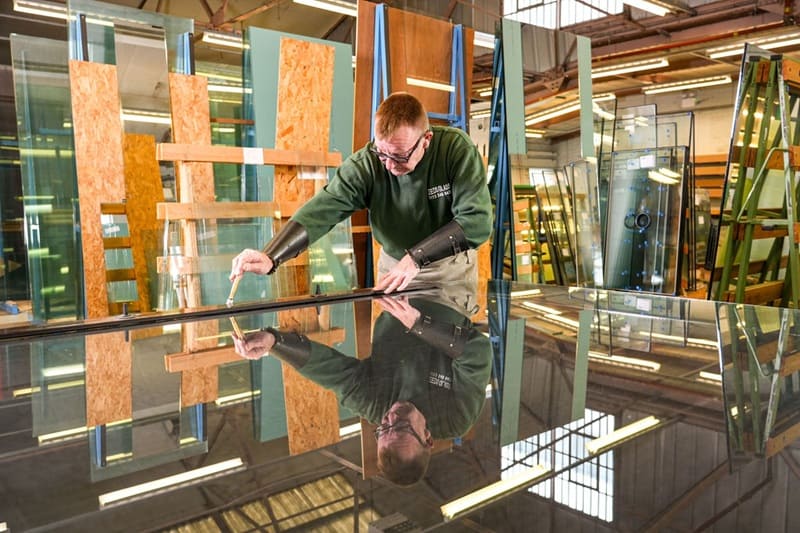
Why glazing matters for commercial buildings
Energy efficiency
Poor glazing means your heating system works harder in winter and your air conditioning struggles in summer. That’s essentially money leaving through the glass.
Modern commercial glazing helps keep indoor temperatures steady, reduces condensation issues and cuts energy waste. For businesses managing multiple properties or large buildings, the savings can add up quickly.
Security and safety
Ground-floor windows and shopfronts need to withstand more than just the weather. The right glass can resist impact, prevent break-ins and protect your business out of hours.
Safety glazing is also required in certain locations to protect people if the glass breaks. Getting this right isn’t just good practice; in many cases, it’s a legal requirement under UK Building Regulations.
Comfort and productivity
Draughty windows and excessive outdoor noise affect how comfortable people feel in your building. Improved commercial glazing creates a more pleasant, inviting environment for both staff and visitors.
Cutting down external noise from busy roads can make open-plan offices calmer and easier to focus in, while better thermal performance means fewer complaints about cold spots or overheating near windows.

Energy savings and comfort: what to specify
Double glazing vs triple glazing for commercial properties
Double glazing is the standard choice for many offices and commercial properties in Yorkshire. Two panes of glass with a sealed gap between them offer good thermal performance at a reasonable cost.
Triple glazing adds a third pane, creating two sealed air cavities. It offers better insulation and can be worth considering when energy efficiency is a priority or where external noise is problematic.
Understanding U-values and G-values
The U-value measures how well a window prevents heat from escaping. Lower numbers mean better insulation. For commercial buildings in Yorkshire, windows with low U-values can help reduce heating costs during our cold winters.
The G-value measures how much solar heat passes through the glass. A higher G-value can provide free heating from the sun in winter but might cause overheating in summer if you have large south-facing windows.
Getting the balance right depends on your building’s location and any existing heating or air conditioning.
Low-E coatings and performance features
Modern commercial glazing often includes low-emissivity (Low-E) coatings. These microscopic metallic layers reflect heat back into the room while allowing light through.
Other features that improve performance include argon gas filling the gap between panes (which insulates better than air) and warm-edge spacer bars that minimise heat loss around the edges of the glass.
Speak to our commercial glazing specialists
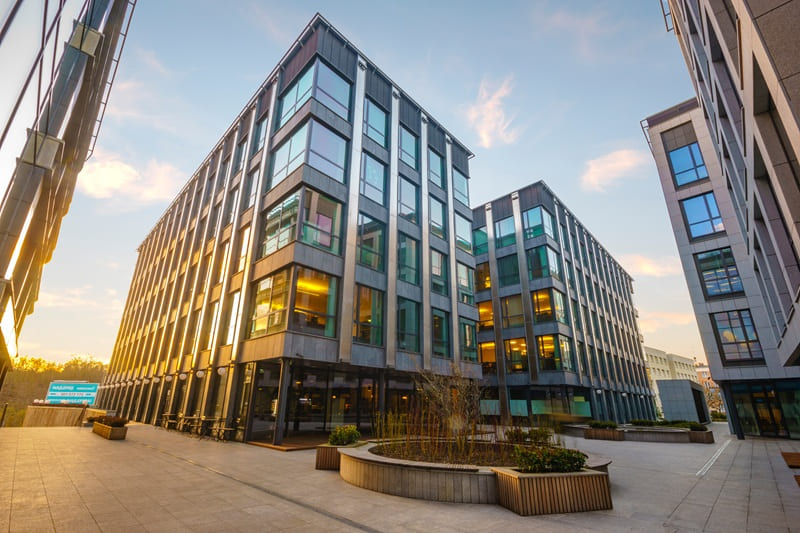
Security and safety glazing options
For commercial glazing in Leeds and across West Yorkshire, the glass you choose needs to do two jobs: protect your building from intruders and keep people safe. Modern glazing gives you some effective options.
Toughened vs laminated glass
Toughened glass is strengthened through heat treatment. If it breaks, it shatters into small, blunt pieces rather than dangerous shards. It’s used where there’s a risk of impact and where safety regulations require it.
Laminated glass adds a plastic layer between two panes, so if the glass breaks, the pieces stick to the plastic layer rather than falling out. This makes it harder for intruders to break through and is a go-to for areas that need extra protection.
Combined with quality frames and locks, the right security glazing makes your property a much less attractive target. Most opportunist break-ins are abandoned if entry takes more than a couple of minutes.

Noise control for offices and other commercial spaces
External noise can be frustrating for everyone inside. Traffic, building work and even general street noise can cause problems for concentration and productivity in a commercial property.
Acoustic glazing options
Acoustic glazing is designed to cut down on noise coming through windows. It uses laminated glass with a special internal layer that dampens sound as it passes through.
For offices or clinics where quiet matters, acoustic glazing can make a noticeable difference.
Why installation matters
Even good acoustic glass won’t do its job properly if it’s poorly fitted. Gaps around frames, inadequate sealing or poor-quality hardware all create areas where sound can sneak through.
If you need trickle vents for ventilation, make sure they’re acoustic versions – standard vents can let in unwanted noise and undermine the good work the glazing is doing.
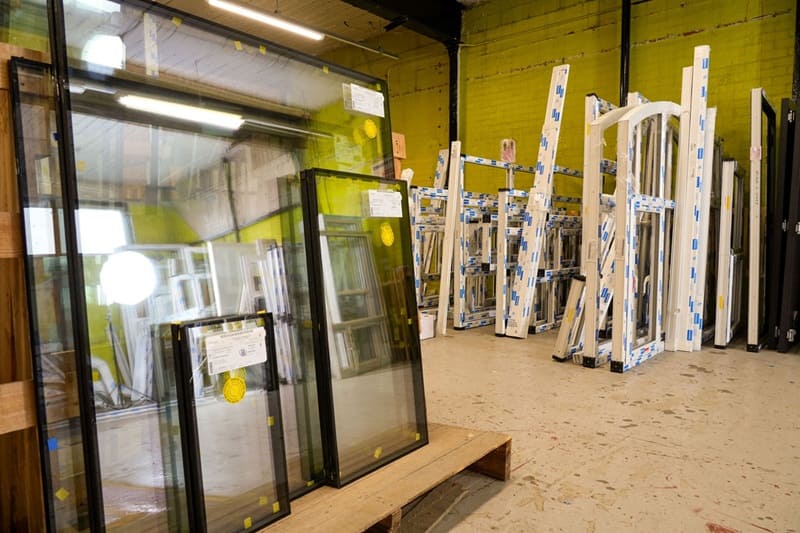
Choosing frames for commercial buildings
The glass itself is only one part of the equation – the frames need to suit how your building is used, how it looks and the maintenance your team can realistically manage.
For most commercial properties in Leeds and West Yorkshire, you’ll be choosing between aluminium and uPVC. Here’s what works where:
Aluminium frames
The most common choice for offices, shopfronts and larger commercial buildings. Aluminium is:
- Strong enough to support large panes without obtrusive frames
- Durable and low-maintenance – it holds its finish for years
- Suitable for modern and traditional buildings
- Available with thermal breaks (insulating strips built into the frame) to prevent heat loss
uPVC frames
uPVC is less common in commercial settings but still a practical choice for smaller buildings and projects where budget and energy efficiency matter. uPVC offers:
- Good thermal performance
- Minimal maintenance requirements
- A lower price point than aluminium
uPVC isn’t always suitable for large openings (like glass storefronts) and can look less polished in commercial environments. It works best for smaller offices, industrial units or back-of-house areas.
When to consider specialist systems
Some buildings need more than standard frames. Listed buildings or conservation areas might need bespoke systems that match existing styles while meeting modern performance standards. If that sounds like your situation, it’s worth discussing options early in the planning stage.
Speak to our glazing specialists
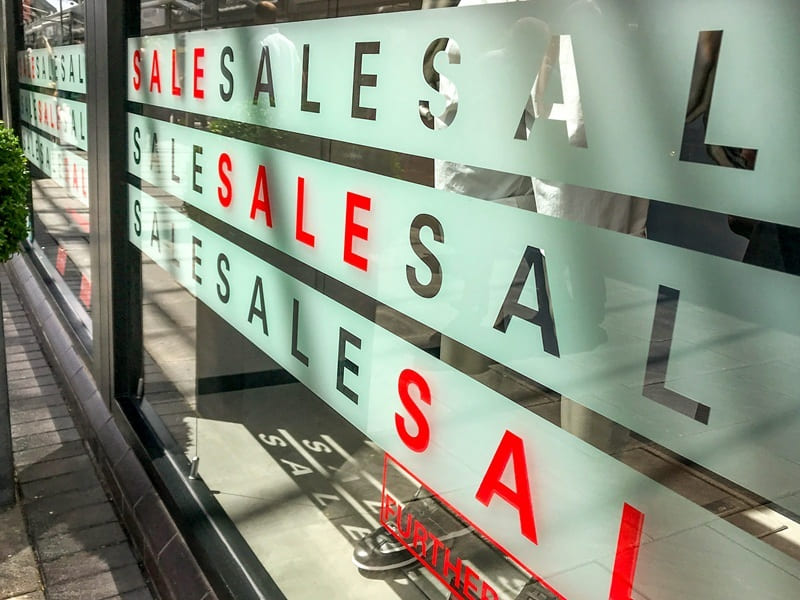
Shopfront windows and entrances
Your shopfront is the first thing customers see, so the glazing needs to work hard by:
- Letting people see your products clearly
- Meeting any accessibility requirements
- Keeping your building secure when you’re closed
Design and visibility
Large panes of glass make a retail space feel brighter and more inviting. Think about where you position any bars between panes – it makes a difference if you want uninterrupted views of window displays or branding.
If you have full-height glazing or glass doors that could look like an open space, they should include safety manifestations: frosted patterns or graphics that make it clear the glass is there. This is a legal requirement in most commercial buildings.
Security when you’re closed
Shopfronts are vulnerable outside business hours. Laminated security glass makes forced entry more difficult and allows time for alarms to trigger and police to respond.
If things do go wrong, broken shopfront glass needs sorting fast, both for security and so you can keep trading. We offer a fast replacement service, carried out by local glaziers who are fully qualified to the highest standards.
Our commercial glass repair and replacement services
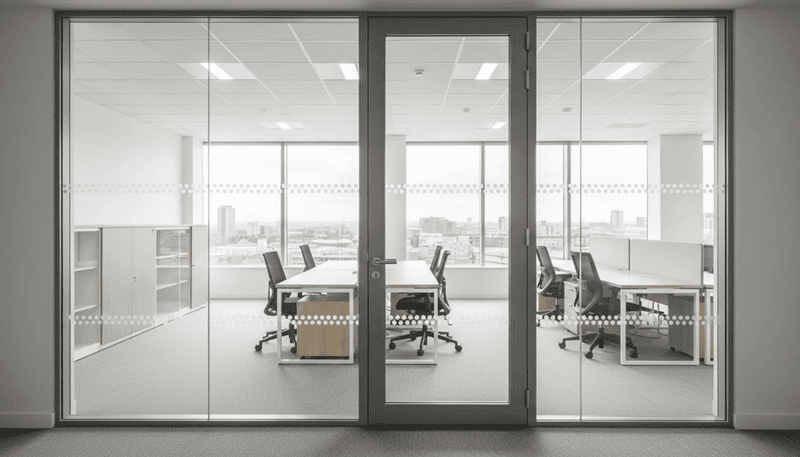
Regulations and standards: what to know
Getting commercial glazing right means meeting certain legal requirements.
Building Regulations Part L: Energy performance
The Building Regulations Part L (Conservation of fuel and power) outlines minimum energy requirements. The goal is to reduce carbon emissions and improve energy efficiency in line with the UK’s net-zero targets:
- New or replacement windows must meet minimum thermal efficiency standards
- U-values need to comply with current regulations
- Proper documentation is required on completion of the work
Building Regulations Part K: Safety glazing
The Building Regulations Part K (Protection from falling, collision and impact) exists to prevent injury from glass in ‘critical locations’ where people could collide with, fall through or get injured by broken glass.
- Certain locations need safety glazing by law, including doors, side panels, low-level glazing, overhead glazing and anywhere people might accidentally walk into glass
- The two main types of glass that meet the requirements are toughened (or tempered) glass and laminated glass.
Accessibility for commercial entrances
The Equality Act 2010 and the Building Regulations Approved Document M (Access to and use of buildings) are designed to make sure commercial buildings are safe and accessible to everyone, including people with disabilities.
- Large areas of glass should be clearly visible, especially to those with visual impairments, with manifestations (markings) at specific heights
- Safety glass should be used in ‘critical locations’ like doors and the panels directly beside them
- Any commercial building entrances should be accessible, with minimum clear opening widths, level or low thresholds and easy-to-operate hardware
Poor fitting compromises performance, safety and warranties. Always ensure your installer is certified and that you receive handover documentation and warranties.
Get a fast quote for office or shopfront glazing

Cost factors and budgeting
Cost is a factor in any commercial business decision. For glazing, the main things that affect price are:
- Glass: The type of glass you choose makes a difference – low-E coatings, acoustic layers and security laminates add protection and extra cost
- Size and weight: Larger or thicker panes need stronger frames, more labour for safe handling and sometimes specialist equipment
- Frames: Aluminium with thermal breaks typically costs more upfront than uPVC, but it’s more durable, looks premium and holds value over time
- Site conditions: Installation on upper floors, restricted access or busy high-street locations might need scaffolding, traffic management or out-of-hours work to avoid disruption
Remember, the cheapest option isn’t always the best value. Over time, opting for windows with better thermal performance can mean reduced energy bills, fewer callouts for repairs and less maintenance. It’s always worth factoring in the whole-life costs, not just the installation price.
Getting an accurate quote
At Leeds Glass, we know every building is different, so we don’t do blanket price promises. A site survey lets us measure accurately, spot potential challenges and understand exactly what’s needed. We’ll give you transparent options with clear pricing and any extras flagged upfront.
Reach out for a clear, no-obligation quote

FAQs: Commercial glazing in Leeds
What is the best glazing for office energy efficiency in Leeds?
For maximum energy efficiency in a Leeds office, the best glazing combines triple glazing, Low-E glass, gas-filled cavities and warm edge spacers. We’ll conduct a full survey and provide a tailored recommendation.
Do I need laminated or toughened glass for a shopfront?
For a shopfront, laminated glass is the best choice for safety and security, especially for large display windows or glass in ‘critical locations’. Laminated glass offers protection against intruders and holds together when broken.
Can acoustic glazing make open-plan offices quieter?
Yes, acoustic glazing can help make open-plan offices quieter. It’s typically used to reduce noise from outdoors and for creating partitioned, sound-insulated areas like meeting rooms, rather than for general noise reduction across the whole open area.
What are the Building Regulations for commercial windows in the UK?
The UK Building Regulations for commercial windows are primarily detailed in Approved Document L (Conservation of Fuel and Power) for energy efficiency and Approved Document K (Protection from falling, collision and impact) for safety.
How fast can Leeds Glass replace a broken shopfront window?
We offer a fast replacement service. The best way to get a specific estimate is to call our team. We’ll assess the damage and let you know the most effective next steps.
Are aluminium frames better than uPVC for commercial buildings?
Yes, for commercial buildings, aluminium frames are generally better than uPVC. While uPVC is a cheaper and naturally insulating material, aluminium’s superior strength, durability and aesthetics make it a preferred choice for businesses.

How Leeds Glass can help
Our approach is straightforward: we survey your property, have an honest chat about what you need and recommend practical solutions that fit your budget.
We handle everything from surveys through to installation and sign-off, working around your business hours if needed. If things do go wrong – like broken shopfronts or damaged office windows – we can respond fast with emergency replacement glazing to get you secure and trading again.
We’re a local business that stands behind the quality of our work and the expertise of our team. If you need advice, maintenance or support after installation, we’re always here.
Do you need commercial glazing in Leeds or West Yorkshire? Get in touch with our team for a free site survey. We’ll provide honest, straightforward advice tailored to your building.
